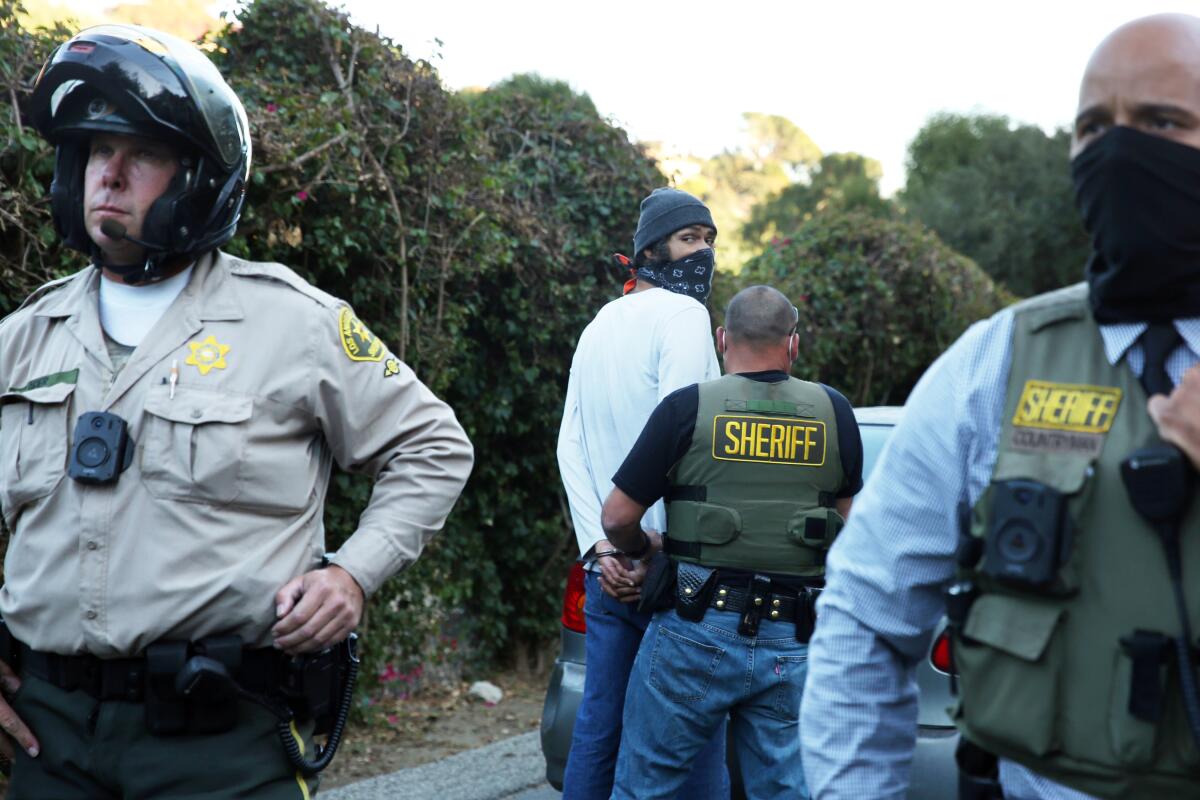L.A. County sheriff claimed protesters tried to derail a train. Footage suggests otherwise

Jasmine Lomax and Krizia Berg were irked by the sheriff’s department’s presence at a protest by Compton City Hall last November. Deputies were out in riot gear and had set up coil barricades throughout the area.
The couple said they grabbed a coil in their own “act of protest” and dragged it across nearby train tracks. The pair dropped it there and headed to their car, they said.
But what they considered a small act of defiance, law enforcement considered a crime worthy of life imprisonment.
Lomax, Berg and a third protester, Emanuel Padilla, would be charged in ensuing days with attempting to derail a train by prosecutors working under former Dist. Atty. Jackie Lacey. The charges sparked protests against the sheriff’s department and became a flashpoint in the battle over criminal justice reform in Los Angeles County after newly elected Dist. Atty. George Gascón took office.
The trio’s legal peril essentially ended just hours after the inauguration of Gascón, who dropped all charges the next day after reviewing video evidence in the case. The move rewarded the growing progressive bloc that vaulted him into office but angered law enforcement officials who have become increasingly vocal, saying that he acts more like a defense attorney than a prosecutor.
A Times review of evidence presented in the case and interviews with prosecutors involved have raised questions about both the validity of some of the charges — as footage of the incident does not line up with descriptions contained in a sheriff’s department report — and Gascón’s decision to dismiss the entire case. Gascón’s move widened the divide between him and his own line prosecutors, after he filed a disciplinary notice against the head deputy in the Compton court over his handling of the case.
The charges against protester Emanuel Padilla, 35, who was charged 11 days earlier than his co-defendants, immediately prompted allegations of retaliation.
Jorge Gonzalez, Padilla’s attorney, alleged the charges were payback because his client is a plaintiff in a class-action lawsuit accusing the sheriff’s department of excessive force during its handling of protests against police brutality over the summer.
“It’s because they recognized him as a repeat protester,” Gonzalez said of Padilla. “This is all about retribution.”
The Times reviewed a copy of surveillance footage of the incident. The video shows Padilla walking by the tracks but not touching the coil. It does, however, show Lomax, 29, and Berg, 30, dragging the coil for a few seconds across a set of tracks before letting go and walking away. The footage does not capture a complete account of the incident, as the camera tracks the women as they walk east, leaving Padilla out of frame.
An initial sheriff’s department incident report also describes only two suspects dragging the metal barricade, neither of whom are Padilla.
Yet three days later, the sheriff’s department filed a supplemental report with the account of a detective who had monitored the protest and “immediately” recognized Padilla there based on information gathered from criminal investigations. He claimed he had witnessed Padilla dragging the coil onto the tracks, in contrast to the video evidence filed in the case. The report said Padilla helped two individuals drag the coil and continued to pull it in a tug-of-war with deputies after the other two had let go.
Lomax and Berg contend the sheriff’s department’s reports were inaccurate.
The couple said that deputies did not try to stop them as they dragged the coil across the tracks. The first incident report describes four detectives walking towards the women and ordering them to release the wire.
“No one told us not to do it, which was strange,” said Lomax. “I would have expected them to shout at us and say not to touch police property.”
There was no tug of war with deputies as described in the report, according to Lomax and Berg, who said they simply dropped the coil when there was too much resistance to keep pulling.
After the women crossed the street, they saw deputies remove the coil. No alarm bells had sounded to alert passersby of an incoming train, they said.
“I think this is part of a continued pattern of LASD retaliation against consistent political protesters,” said Berg, who is a co-plaintiff with Padilla in the class-action lawsuit.
The supplementary report also claimed Padilla confessed during an interrogation after he was arrested on Nov. 18. It said Padilla admitted to dragging a barricade onto the tracks, and that when Padilla was asked what he thought could have happened if a train had made contact with the barricade, he responded that it could have caused an electrical issue.
While prosecutors have pointed to the comments as a “confession,” legal experts think investigators were overplaying their hand. Laurie Levenson, a former federal prosecutor who now serves as a professor at Loyola Law School, said Padilla’s comments did not prove he had any intent to derail the train. Without evidence of intent, the train-wrecking charge would collapse, Levenson said.
“This is not a confession,” she said. “The defendant made statements that the prosecution would want to use against him, but it’s not clear how damaging that would be.”
Gonzalez said he would not comment on the interrogation or whether Padilla touched or dragged the coiled wire, but has held that his client did not have a “malicious” intention to derail a train. He declined to make Padilla available for an interview.
Dist. Atty. George Gascón announces sweeping policy changes for cash bail in L.A. County and bans seeking sentencing enhancements in nearly all cases.
A spokesman for the district attorney’s office said Gascón determined “there was not felonious conduct” after reviewing the video footage and ordered the case to be dismissed in the interest of justice. The footage “does not show Mr. Padilla placing, dropping or otherwise putting any object in the path of a train,” said Max Szabo, a spokesman for Gascón’s transition team.
Szabo also questioned why deputies did not immediately arrest Padilla or the other defendants if their actions could have resulted in immediate danger.
Lt. John Satterfied, a spokesman for the sheriff’s department, has defended the charges against Padilla, Berg and Lomax and denied claims of retaliation. He declined to comment on evidence supporting charges against the protesters or to answer a detailed list of questions from The Times about the footage and the discrepancies between the two sheriff’s department reports.
“The appropriate venue for your questions is in a courtroom during a trial,” Satterfield wrote in an email. “The criminal justice system is not designed to try criminal cases in the media, and at this time releasing confidential information regarding the content and scope of this investigation would severely jeopardize the integrity of this case.”
It remains unclear if the district attorney’s office sent the case back to the sheriff’s department for further investigation. Representatives for Gascón repeatedly failed to respond to questions about the current status of the case.
The move to dismiss put Gascón in direct conflict with one of his office’s most senior employees, Richard Doyle, the head prosecutor in the Compton courthouse. Doyle said he believed the charges against Padilla, Lomax and Berg were appropriate and could have been proven in court based on testimony from the deputies at the scene and statements Padilla made to investigators.
On the day the case was dismissed, Doyle said he was contacted by Deputy Dist. Atty. Mario Trujillo, a close political ally of Gascón, who is now serving as part of his executive staff. Trujillo said Gascón wanted the case dismissed for further investigation, but gave no further explanation as to why, according to Doyle.
“I am not comfortable dismissing what I know to be a viable case without knowing the reason why,” Doyle said.
Liliana Gonzalez, the assistant head deputy district attorney in Compton, said she was present for the conversation and corroborated Doyle’s account, including Trujillo’s lack of an explanation for the dismissal. Trujillo did not respond to a request for comment.
Hours later, Doyle said, Trujillo arrived at the Compton courthouse and dismissed all charges against the protesters in the interest of justice. Shortly after that, Gascón issued a disciplinary letter against Doyle citing his “refusal” to dismiss the charges. Doyle has filed a grievance opposing the discipline, according to his attorney, Alan Jackson.
In mid-January, Doyle was transferred out of the Compton courthouse, and will now oversee prosecutions of environmental crimes, according to a document reviewed by The Times. Jackson accused Gascón of punishing Doyle for speaking to The Times for this story.
“We disclosed we had been contacted by the L.A. Times about a case. Some 25 days later, he’s punitively transferred,” Jackson said. “He goes from running a branch office ... where he’s the head of the entire office, supervising 66 people ... to a division supervising seven people.”
A district attorney’s spokesman declined to comment on Doyle’s statements, citing the discipline issue as a personnel matter.
While the video did not show Padilla touching the cables, Doyle argued it still placed him at the scene of the crime. Taken together with sheriff’s deputies’ testimony that the defendants had placed the cable on the tracks and expert testimony that the coil’s placement could have caused a derailment, Doyle said he believed each charge could have been proven beyond a reasonable doubt.
Levenson said prosecutors would have a difficult time proving any of the defendants intended to cause a derailment, and video footage of the incident did not show deputies acting as if disaster was imminent.
“I didn’t see the sheriff’s [deputies] acting as if there was something life threatening happening. If there was something that was particularly dangerous you would expect the sheriffs to be acting accordingly,” she said. “They weren’t. It’s hard to see what happens at the track, but not even the people around there, the passersby, are acting like, ‘Oh my god, this will be a train wreck.’”
Despite being only feet away from the defendants, the sheriff’s department waited several days to arrest Padilla and has declined to say why. Charges were not filed against Lomax and Berg until early December. Levenson said Gascón’s decision to show discretion in the case was not that unorthodox.
“What happened here was clearly irresponsible, but there’s a difference from grossly irresponsible behavior and criminal behavior that can get you life in prison,” she said.
Doyle said the defendants could have still been charged with a lesser crime, obstructing the train tracks, which Gascón also moved to dismiss. The video reviewed by The Times clearly shows Lomax and Berg placing the coil on the tracks.
“The second count is a general intent crime, so simply placing something on the train tracks … that’s all you need for that crime. It’s a much easier crime to prove,” said Doyle, adding he would have accepted a plea to the lesser count if the case had proceeded.
A district attorney’s office spokesman did not respond to questions about the lesser charges. Legal experts, however, said it would not be unreasonable for Gascón to show discretion and not charge the lesser offense.
Jody David Armour, a law professor at the University of Southern California, said the case “really shines a light” on the importance of Gascón’s election and the discretion he might show in comparison to Lacey. Gascón, for instance, might have considered that the alleged actions occurred in the context of a protest, and harsh charges could have a chilling effect on free speech, Armour said.
“At the end of the day,” he said, “the prosecutor has a lot of discretion to weigh all those kinds of competing interests.”
Times staff writer Alene Tchekmedyian contributed to this report.
More to Read
Sign up for Essential California
The most important California stories and recommendations in your inbox every morning.
You may occasionally receive promotional content from the Los Angeles Times.












